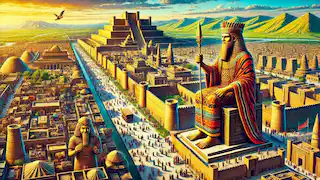Chapter 1: The Great City of Uruk
In ancient Mesopotamia, the great city of Uruk stood tall, with its magnificent walls and bustling streets. King Gilgamesh, two-thirds god and one-third man, ruled over this splendid city. His strength and wisdom were unmatched, yet his oppressive rule left his people in despair.
Gilgamesh, though a mighty and wise king, often acted with arrogance and tyranny. His subjects lived in constant fear, their lives marked by the whims of their ruler. He demanded the right to spend the first night with every bride, a decree that filled the hearts of his people with sorrow and anger.
The gods, hearing the cries of the people, decided to intervene. They believed that Gilgamesh needed a counterpart, someone who could match his strength and challenge his heart. Thus, they created Enkidu, a wild man fashioned from clay and brought to life by the goddess Aruru.
Enkidu roamed the wilderness, living among the animals and knowing no human contact. His strength was equal to Gilgamesh’s, and he was destined to change the king’s heart.
Chapter 2: The Encounter
One day, a trapper came upon Enkidu drinking at a waterhole, marveling at his wild strength. Terrified, he rushed to Uruk to inform Gilgamesh of the wild man who was disrupting his traps. Gilgamesh advised the trapper to take Shamhat, a temple priestess, to tame Enkidu.
Shamhat, with her beauty and wisdom, approached Enkidu. For seven days and nights, she taught him the ways of civilization. She bathed him, fed him, and introduced him to the ways of humanity. Enkidu found himself changed. He felt the call to go to Uruk and meet the one who ruled so tyrannically.
Upon his arrival in Uruk, the people marveled at Enkidu’s presence. His wild appearance contrasted starkly with the civilized city. Gilgamesh, hearing of Enkidu’s approach, anticipated a challenge to his reign.
Chapter 3: Friendship and Transformation
Enkidu entered Uruk, seeking Gilgamesh. The two met and clashed in a fierce battle, shaking the city’s foundations. They grappled and fought with equal might, their strength causing the earth to tremble. Yet, neither emerged victorious, and in their struggle, they found mutual respect. Their fight transformed into a deep friendship, and Enkidu became Gilgamesh’s loyal companion.
Together, they decided to embark on great adventures. They sought fame and immortality through heroic deeds, determined to leave a lasting legacy. Their friendship softened Gilgamesh’s heart, and he began to rule with more compassion and wisdom.
Chapter 4: The Cedar Forest
Their first quest led them to the Cedar Forest, guarded by Humbaba, a fearsome demon. Gilgamesh and Enkidu set out with the blessings of the sun god, Shamash, who provided them with guidance and protection. The journey was perilous, but their combined strength and courage saw them through.
The path to the Cedar Forest was fraught with danger. They encountered wild beasts and treacherous landscapes. Each night, they prayed to Shamash for protection and guidance, and each day, they pressed forward with determination.
Upon reaching the forest, they confronted Humbaba. The demon’s roars echoed through the trees, and his fiery breath scorched the earth. Yet, with the aid of Shamash, they defeated Humbaba and claimed the sacred cedars, solidifying their fame. They cut down the tallest trees, using the wood to build great gates for the city of Uruk.
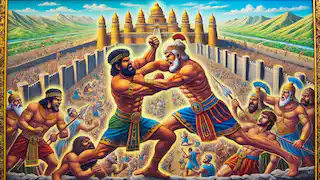
Chapter 5: The Bull of Heaven
Back in Uruk, their victory brought joy, but also the attention of the goddess Ishtar. Infatuated with Gilgamesh, she proposed marriage. However, Gilgamesh rejected her advances, recounting the fates of her previous lovers. Furious, Ishtar demanded her father, Anu, send the Bull of Heaven to punish Gilgamesh.
The Bull of Heaven descended upon Uruk, causing chaos and destruction. Its mighty hooves cracked the earth, and its breath dried up the rivers. The people of Uruk fled in terror as the beast rampaged through their city. Gilgamesh and Enkidu faced the celestial beast together, their unity and valor prevailing once more. They killed the bull, saving their city but incurring the wrath of the gods.
As they celebrated their victory, Gilgamesh and Enkidu offered the bull’s heart to Shamash in gratitude. However, their triumph was overshadowed by the gods’ anger. Ishtar wept over the carcass of the Bull of Heaven, cursing Gilgamesh and Enkidu for their defiance.
Chapter 6: Enkidu’s Fate
The gods, angered by the slaying of the Bull of Heaven, decreed that Enkidu must die as punishment. Stricken by a mysterious illness, Enkidu dreamt of the underworld and lamented his fate. He saw visions of the dark and dreary realm, where the dead ate dust and drank muddy water.
Gilgamesh stayed by his side, but his efforts were in vain. Enkidu succumbed to the illness, leaving Gilgamesh heartbroken and in despair. In his final moments, Enkidu cursed the trapper and Shamhat for bringing him to civilization, but then he blessed them, realizing that his friendship with Gilgamesh had brought him great joy.
Grief-stricken, Gilgamesh mourned for his friend, realizing the inevitability of death. He wandered through the wilderness, wearing the skins of lions and letting his hair grow wild. He sought to escape the sorrow that consumed him, but it was an ever-present shadow.
Gilgamesh vowed to find the secret of immortality, determined not to share Enkidu’s fate.
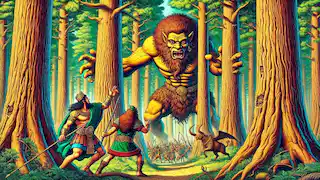
Chapter 7: The Quest for Immortality
Gilgamesh embarked on a perilous journey to find Utnapishtim, the immortal man who survived the Great Flood. He traveled through treacherous landscapes, crossing the Mountains of Mashu, guarded by scorpion-men, and traversing the Waters of Death.
The Mountains of Mashu were a formidable barrier, their peaks reaching the heavens and their bases touching the underworld. The scorpion-men, guardians of the mountains, warned Gilgamesh of the dangers ahead. Undeterred, he pressed on, enduring the scorching sun and the biting cold.
He finally reached the garden of the gods, where he met Siduri, the alewife. She advised him to abandon his quest and enjoy the simple pleasures of life, but Gilgamesh was resolute. Siduri directed him to Urshanabi, the ferryman, who could help him cross the Waters of Death.
With Urshanabi’s help, Gilgamesh built a boat and navigated the treacherous waters. They encountered sea serpents and raging storms, but Gilgamesh’s determination saw them through. He finally reached Utnapishtim, who recounted the tale of the Great Flood and his divine gift of immortality.
Utnapishtim challenged Gilgamesh to stay awake for six days and seven nights to prove his worthiness. Gilgamesh failed, falling into a deep sleep. When he awoke, he realized that he had slept for seven days, his chance for immortality lost.
Chapter 8: The Plant of Rejuvenation
Upon waking, Utnapishtim’s wife took pity on Gilgamesh and revealed the existence of a plant that could restore youth. Gilgamesh retrieved the plant from the depths of the ocean, but his joy was short-lived. While he bathed, a serpent stole the plant, shedding its skin as it slithered away, symbolizing rebirth.
Disheartened, Gilgamesh lamented the futility of his quest. He realized that true immortality lay not in eternal life but in the legacy one leaves behind. His journey had taught him the value of life and the importance of the bonds he formed with others.
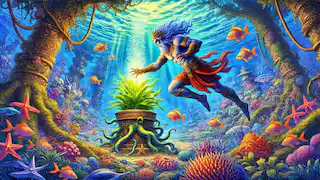
Chapter 9: The Return to Uruk
Gilgamesh returned to Uruk, accepting the inevitability of mortality. He reflected on his journey, understanding that immortality lay not in eternal life, but in the legacy one leaves behind. He admired the great walls of Uruk, understanding that his deeds and the city he built would endure through time.
Upon his return, Gilgamesh dedicated himself to the betterment of Uruk. He implemented reforms to improve the lives of his people, ensuring justice and fairness. He constructed magnificent temples and monuments, each a testament to his reign and the prosperity of his city.
He became a wiser and more compassionate ruler, his friendship with Enkidu forever etched in his heart. He realized that the love and respect of his people were more valuable than any divine favor. Gilgamesh’s fame spread far and wide, his story inspiring other rulers and warriors.
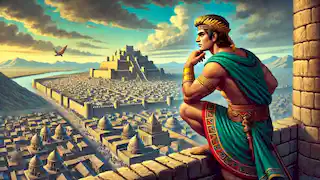
Chapter 10: The Legacy of Gilgamesh
The Epic of Gilgamesh, inscribed on clay tablets, endured through millennia, recounting the tale of a king who sought immortality and found wisdom. His story inspired countless generations, a testament to the enduring power of friendship, courage, and the human spirit.
In the end, Gilgamesh's journey revealed that the true essence of life lies in the bonds we form and the legacies we leave behind. His epic continues to resonate, a timeless reminder of the quest for meaning and the strength found in unity and love.
The lessons of Gilgamesh's epic were passed down through the ages, teaching the values of courage
, friendship, and wisdom. Scholars and storytellers preserved his tale, ensuring that his name would never be forgotten. The walls of Uruk, built by Gilgamesh’s own hands, stood as a lasting monument to his reign, a symbol of the greatness he achieved.
As the sun set over the great city of Uruk, Gilgamesh stood atop its walls, looking out over his kingdom. He felt a profound sense of peace, knowing that his journey had come full circle. He had sought immortality and found it in the hearts of his people and the enduring legacy of his deeds.
The epic of Gilgamesh remains one of humanity’s oldest and most cherished stories, a beacon of the timeless quest for meaning and the power of human connection. Through his adventures, Gilgamesh discovered that the true measure of a life well-lived lies not in eternal existence, but in the love, courage, and wisdom one leaves behind.
